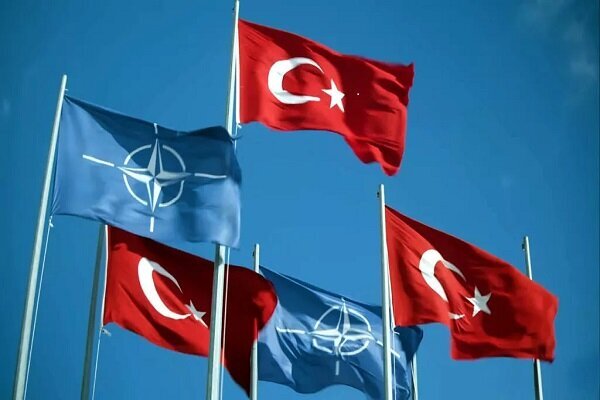Will Turkey block Finland, Sweden NATO bid?

TEHRAN - Despite opposing bids by Sweden and Finland to join NATO, Turkey will try to control the level of tension with other member states because the country is well familiar with its economic weaknesses.
Efforts by Finland and Sweden to join the North Atlantic Treaty Organization (NATO) have become a hot topic in international relations.
On May 13, Turkish President Recep Tayyip Erdogan clearly announced Ankara’s objection to applications by these two Nordic states. According to Anadolu Agency, Erdogan said that Turkey had made a mistake by not blocking Greece's membership in NATO and does not want to repeat that mistake. He also accused Finland, Sweden, and the Scandinavian countries as a whole of backing the PKK and its supporters.
Despite the Turkish objection, Finland and Sweden officially submitted their bid on May 18.
NATO Secretary-General Jens Stoltenberg said during a Thursday visit to Copenhagen that he was “confident that we will come to a quick decision to welcome both Sweden and Finland to join the NATO family.”
“We are addressing the concerns that Turkey has expressed, because when an important ally (like) Turkey raises security concerns, raises issues, then of course the only way to deal with that is to sit down and find common ground,” Associated Press quoted him as saying.
NATO states consider PKK a terrorist organization but are not in agreement with Turkey about the PYD and its military wing YPG, which is active in Syria. This is still a source of discord between Turkey and other NATO members, including the United States.
When Turkey started military operations in northeast Syria back in 2019, some European countries – including Sweden and Finland – imposed restrictions on arms sales to Ankara. These restrictions are one of the many reasons behind Turkey’s opposition to the new bid. Turkish Foreign Minister Mevlut Cavusoglu referred to this issue after an unofficial meeting of NATO members on May 15, Anadolu Agency reported.
Meanwhile, a growing belief in Turkey is that NATO is not taking into account the country’s security concerns and that even some member states are providing arms support to YPG that is acting against Turkey’s interest and territorial integrity.
As a West Asian member of NATO, Turkey has a special geopolitical status and this boosts the country’s political maneuver. The main question is how far Ankara can go in opposing the bid by Finland and Sweden to join NATO which is backed by all other members of the military alliance.
When acting as Turkish Prime Minister in 2009, Erdogan had opposed the appointment of former Danish Prime Minister Anders Fogh Rasmussen as NATO Secretary-General. Ankara eventually withdrew its opposition after diplomatic negotiations.
Differences between Turkey and other NATO members, especially the U.S., have since deepened as the former has insisted on some positions such as buying the S-400 missile system from Russia; however, one should take notice of the level that the Turkish economy can tolerate political confrontation with other member states.
According to the Turkish Statistical Institute, the country is witnessing significant inflation (that hit 70% in April). Therefore, swimming against the tide may incur economic costs such as the fall of the lira and increase in inflation besides bringing about social discontent.
Accordingly, Erdogan’s top foreign policy advisor Ibrahim Kalin opted for a milder stance while talking to Reuters on May 14. He said that Turkey is “not closing the door” to Finland and Sweden’s bid.
Turkish authorities are aware that although the veto right can be used on paper, the ultimate decision will be taken by main players such as the U.S.
Turkey has good relations with Russia but this does not mean that it has been influenced by Moscow for confronting other NATO members. Ankara has earlier expressed clear opposition to Russia on issues such as the Crimea annexation, Syrian developments, and the war in Ukraine while also preserving its relations with Moscow.
What are Turkey’s demands?
Turkey wants the Finnish and Swedish governments to condemn and put pressure on the PKK and its supporters. Although, this is not the only demand put forward by Ankara.
Three Turkish officials, speaking to Bloomberg on May 17 on condition of anonymity, said Ankara wants the two European countries to put an end to arms-export restrictions that they had imposed on Turkey. Other demands of Turkey include a return to the F-35 program, purchasing F-16 warplanes, and removal of sanctions imposed on the country after possession of the S-400 missile system.
It will not take too long before realizing how far Ankara can preserve this approach. Turkey may suffer political and economic consequences by continued insistence on blocking Finland and Sweden.
Accordingly, it seems that Ankara will refrain from standing against the demands of other NATO members in the long run. However, it clearly sees current circumstances as a good opportunity for meeting parts of its needs. Turkey will try to obtain concessions from key NATO members such as the United States while also controlling the level of tensions.
Leave a Comment